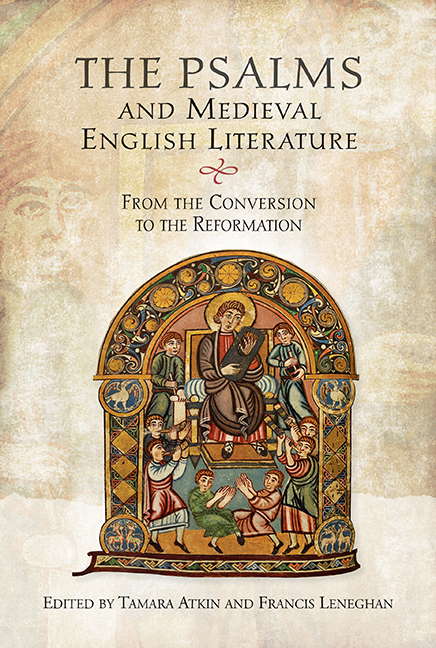Book contents
- Frontmatter
- Contents
- Figures
- Contributors
- Preface
- Acknowledgements
- Abbreviations
- Miscellaneous Frontmatter
- Introduction A Case Study of Psalm 50.13 in Old and Middle English
- I Translation
- II Adaptation
- 6 Making the Psalter Sing: the Old English Metrical Psalms, Rhythm and Ruminatio
- 7 The Psalms in the Old English Office of Prime
- 8 Psalm Genres in Old English Poetry
- 9 Articulating the Psalms in Middle English Alliterative Poetry: Some Passages of Piers Plowman, St Erkenwald and Pearl
- III Voice
- Index
6 - Making the Psalter Sing: the Old English Metrical Psalms, Rhythm and Ruminatio
from II - Adaptation
Published online by Cambridge University Press: 09 May 2017
- Frontmatter
- Contents
- Figures
- Contributors
- Preface
- Acknowledgements
- Abbreviations
- Miscellaneous Frontmatter
- Introduction A Case Study of Psalm 50.13 in Old and Middle English
- I Translation
- II Adaptation
- 6 Making the Psalter Sing: the Old English Metrical Psalms, Rhythm and Ruminatio
- 7 The Psalms in the Old English Office of Prime
- 8 Psalm Genres in Old English Poetry
- 9 Articulating the Psalms in Middle English Alliterative Poetry: Some Passages of Piers Plowman, St Erkenwald and Pearl
- III Voice
- Index
Summary
Was he under hiofenum hearpera mærost
ðara we on folcum gefrigen hæben.
Sangere he was soðfæstest.
(Kentish Psalm, ll. 3–5a)[He [i.e. David] was the most famous of harpers under the heavens of those whom we have heard about among peoples. He was the most righteous singer.]
et psalmista canens metrorum cantica voce
(Aldhelm, Preface to the Ænigmata, l. 21)[Likewise the psalmist singing metrical songs out loud]
Anglo-Saxon poets composing in both Old English and Latin knew that the Psalms were originally songs set to music and so thought of David as both a poet and musician. The Psalms contain many references to singing and the playing of musical instruments (e.g. Pss. 32.2–3, 97.5–6, 150.3–5), and patristic commentaries which treat the Psalms as songsof praise and lament uttered (for the most part) by David/Christ were well known to the Anglo-Saxons. As Jerome puts it in his Preface to the Chronicle of Eusebius:
Denique quid Psalterio canorius? quod in morem nostri Flacci, et Graeci Pindari, nunc iambo currit, nunc alcaico personat, nunc Sapphico tumet, nunc semipede ingreditur.
[In fact, what can be more musical than the Psalter? Like the writings of our own Flaccus and the Grecian Pindar it now trips along in iambics, now flows in sonorous alcaics, now swells into sapphics, now marches in half-foot metre.]
However, in his own translations of the Psalter, which were to become the most widely used versions in the Middle Ages, Jerome employs the medium of prose rather than verse. Despite the frequent appearance of rhetorical (and indeed poetic) devices such as alliteration, homeoteleuton and polyptoton, Jerome's prose style lacks the inherent musicality of the original Hebrew verse, a fact which Bede acknowledges in his stylistic treatise De schematibus et tropis during his discussion of paromoen(alliteration):
Paromoen est, cum ab hisdem litteris diuersa uerba ponuntur. Quae nimirum figura, quia ad positionem litterarum pertinet, melius in ea lingua qua Scriptura est edita requiritur. Habemus tamen nos et in translatione unde demus exemplum. Dictum est in psalmo: ‘Beneḏiximus uos ḏe ḏomo Ḏomini; Ḏeus ḏominus et inluxit nobis.’ Et: ‘Ira illis secundum similitudinem serpentis, sicut aspidis surdae.’ (Underlining added.)
[Paromoenis a sequence of different words beginning with the same letter. Of course, since this figure depends on spelling, it is better sought in the language in which the Scripture was first proclaimed.
- Type
- Chapter
- Information
- The Psalms and Medieval English LiteratureFrom the Conversion to the Reformation, pp. 173 - 197Publisher: Boydell & BrewerPrint publication year: 2017



